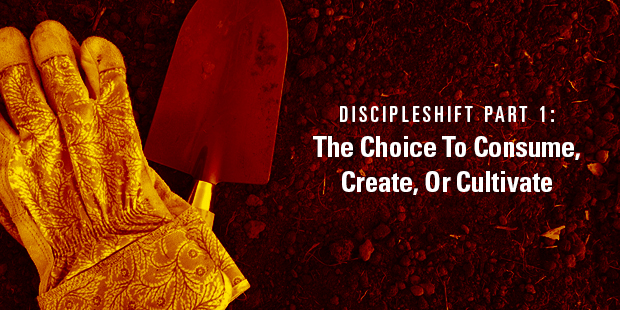
DiscipleShift Part 1: The Choice to Consume, Create, or Cultivate
I recently sat down with a 20-something who asked for some advice on how to become more productive in serving the Lord. He wanted to think more deeply and live more fully, and he wondered what he could start doing to cultivate the kind of life that would bear fruit for God’s kingdom in future decades.
Reflecting on my 20s, one answer came to mind. Every day, in the free time we have available, we have the choice to consume something, to create something, or to cultivate something. The pressures of this current cultural moment push us to consume, but the need of the day is for more people to create or cultivate.
Choice Before You
At the end of a long day at work, you’re greeted with an array of options. In that moment, the easiest choice is to consume. You watch a few episodes of your favorite show on Netflix, or you kill time by killing bad guys on a video game, or you sit back and cheer for your favorite sports team. There’s nothing wrong with any of these recreational activities. We need time off from pursuing productivity and efficiency. We’re human beings, not machines.
But I think the greater temptation in our day is that we move too easily between the machine-like efficiency of the workplace to the machine-like consumption of entertainment. Over time, we develop the idea that passive consumption is what we work for and live for.
Surely we were made for more than powering through the work week so we can spend hours binge watching TV or gaming on the weekends! God has built into us a rhythm of work and rest, yes, but it is a fallacy to believe that resting is always and only consumptivein nature. Restful activity can also be spent in cultivating and creating.
Consuming, Cultivating, or Creating
Here are the differences I have in mind:
- Consuming: the passive reception of entertainment. As consumers, we spend time entertaining ourselves through television shows, movies, video games, and so on. These activities demand little of us.
- Cultivating: the intentional development of something. As cultivators, we engage in something that makes a demand of us. It can be the development of the mind through reading and study, or cultivating of a skill or hobby, or restoring a car, or playing a musical instrument, or working in the garden. These activities require mental or physical exertion as we make something of the world we’ve been given. In turn, the activities develop us.
- Creating: the invention of something that did not exist before. As creators, we leave something behind for others to enjoy and benefit from. We might compose a piece of music, write a poem or story or article, or paint a portrait.
We live in a culture that drives us toward consumption, not creation or cultivation. The result is we assume creating is work and consuming is rest. We assume that anything that demands something of us must be tiresome and strenuous. And so, in our free time, we naturally gravitate toward the activities that are easiest and most immediately gratifying. We choose distraction over development.
Enjoying the Creative and Cultivating Aspects of Life
We need a generation of young people to resist that tendency and to see through that fallacy. We are humans, not robots. We can train ourselves to enjoy the creative and cultivating aspects of life, even if they require something of us.
We can enjoy cooking as much as we enjoy the meal. We can enjoy the day’s yard work as much as we enjoy sitting on the patio on a summer evening with the smell of freshly cut grass in the air. We can enjoy planting flowers as much as we enjoy admiring them. We can enjoy writing songs as much as we enjoy singing them.
Finding joy in creating and cultivating doesn’t come naturally in a society that presses us to consume, consume, consume. The only way to escape the consumption trap is to spend your free time by choosing, again and again and again, to create or cultivate something rather than just consume.
Be Intentional
In The Tech-Wise Family, Andy Crouch describes how he sets up the furniture in his home to emphasize activities that lead toward culture-making instead of consumption. I love the intentionality behind that practice.
Now, unlike Andy, my family has a television in our living room, and we watch it. Corina and I have favorite shows. I enjoy playing games on my phone with my son. My daughter and I like to watch classic TV together. I am not against passive consumption. Entertainment can be part of a well-balanced life. All of these activities have their place.
But we need a strong dose of intentionality with how we spend our free time. How often are you cultivating or creating something? The trick is to choose cultivation or creation so often that you begin to prefer to create something rather than consume something. Once you reach that point, you’ve arrived at a place where you’re unlikely to fall into the same consumptive patterns as everybody else.
You face a choice every day, week, month, and year. To create, to cultivate, or to consume. If Christians will regularly choose the former over the latter, we’ll stand out in a world that knows only the immediate gratification of consumption. And we’ll display for the world the joy of fulfilling humanity’s purpose of cultivation, as we reflect the image of the One who made us.

Tags: Consuming, Creating, Cultivating, Discipleshift, Trevin Wax












